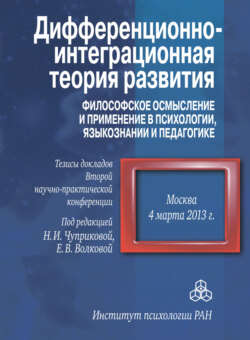Читать книгу Дифференционно-интеграционная теория развития. Философское осмысление и применение в психологии, языкознании и педагогике. Тезисы докладов Второй научно-практической конференции. 4 марта 2013 г., Москва - Коллектив авторов, Ю. Д. Земенков, Koostaja: Ajakiri New Scientist - Страница 3
Opening address
ОглавлениеIn philosophy and science many thinkers (J. Komensky, G. Hegel, V. Soloviev, K. Ber, I. Setchenov, A. Bogdanov, K. Levin, H. Werner etc.) consider the differentiation – integration law of development as general and universal one.
In the middle of the past century Heinz Werner formulated the Orthogenic Concept of Development – a holistic psychological theory which tends to stress the organization, unity, and integration of human beings expressed through each individual’s inherent growth or developmental tendency. This theory made it possible to combine and generalize many previously disconnected facts of general and developmental psychology, psychology of “primitive” cultures, clinical psychology, the intelligence psychometrics.
Recently the analysis of modern research carried out by N. I. Chuprikova has shown that many new psychological and psychophysiological facts, some partial theories not known to H. Werner, and empirical data described by J. Piaget perfectly fit into the general scheme of the differentiation – integration law.
The first conference on this problem in our country organized by PI RAE, IP RAS, MSPPU took place in 2009. The conference expanded materials were published in collective volume “Differentiation – integration theory of development” (2011). Twenty scientists representing different areas and directions in mental development studies contributed to this book. The contributions are framed to the integration – differentiation theoretical approach both conceptually and terminologically, many results and conclusions cross-confirm and complement others.
The present one, the second conference is devoted to discussion of this theoretical approach. A number of new problems and questions are raised in the presented reports, such as: links of the differentiation – integration theory of development with the self-organization theory, new points of view on the origin of mind and mental development in phylogenesis and the creativity mechanism, new programs of training corresponding to the differentiation – integration way of mental development.
It is important to notice that in some current research abroad the ideas about differentiation – integration character of development and “pyramidal” (i. e. from the general to the particular) structure of brain information processes are used for discussion of experimental data. But unlike Russian research, these works are not part of more than 350-year-old tradition of the European theoretical scientific thought.
It is hardly possible to doubt about the value of the general interdisciplinary theory overcoming national barriers and connected with names of Komensky, Hegel, Spenser, Soloviev, Setchenov, Werner. This theory would unite substantially different directions, areas and aspects of mental development research and promote consolidation of forces and progress of the general evolutionary view on the world development.
N. I. Chuprikova
Psychological Institute, Russian Academy of Education
